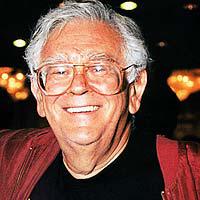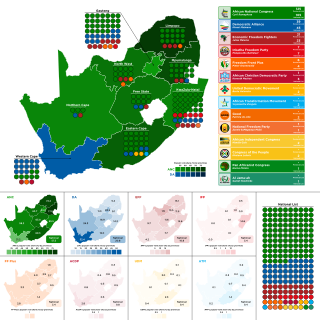
The South African Communist Party (SACP) is a communist party in South Africa. It was founded in 1921 as the Communist Party of South Africa (CPSA), tactically dissolved itself in 1950 in the face of being declared illegal by the governing National Party under the Suppression of Communism Act, 1950. The Communist Party was reconstituted underground and re-launched as the SACP in 1953, participating in the struggle to end the apartheid system. It is a member of the ruling Tripartite Alliance alongside the African National Congress and the Congress of South African Trade Unions (COSATU) and through this it influences the South African government. The party's Central Committee is the party's highest decision-making structure.

The Democratic Alliance is a South African political party and the official opposition to the ruling African National Congress (ANC). The party is broadly centrist, and has been attributed both centre-left and centre-right policies. It is a member of Liberal International and the Africa Liberal Network. The DA traces its roots to the founding of the anti-apartheid Progressive Party in 1959, with many mergers and name changes between that time and the present. The DA ideologically shows a variety of liberal tendencies, including neoliberalism, social liberalism, classical liberalism, and conservative liberalism.

Joe Slovo was a South African politician, and an opponent of the apartheid system. A Marxist-Leninist, he was a long-time leader and theorist in the South African Communist Party (SACP), a leading member of the African National Congress (ANC), and a commander of the ANC's military wing uMkhonto we Sizwe (MK).

General elections were held in South Africa on 22 April 2009 to elect members of the National Assembly and provincial legislatures. These were the fourth general elections held since the end of the apartheid era.

The Congress of the People (COPE) is a South African political party formed in 2008 by former members of the African National Congress (ANC). The party was founded by former ANC members Mosiuoa Lekota, Mbhazima Shilowa and Mluleki George to contest the 2009 general election. The party was announced following a national convention held in Sandton on 1 November 2008, and was founded at a congress held in Bloemfontein on 16 December 2008. The name echoes the 1955 Congress of the People at which the Freedom Charter was adopted by the ANC and other parties, a name strongly contested by the ANC in a legal move dismissed by the Pretoria High Court.

The politics of the Western Cape differs from that of most other provinces in South Africa, because, unlike the other provinces, the African National Congress (ANC) does not dominate the political landscape. The Western Cape's political landscape is also notable for the presence of a relatively strong local devolution and seperatist movement.
Marius "Manqoba" Redelinghuys is a South African politician and a Member of Parliament for the Democratic Alliance (DA). He was first elected to the National Assembly on 7 May following the 2014 national elections. For a year he had also been one of two DA National Spokespersons

Marius Llewellyn Fransman is a South African politician and teacher. He served as Leader of the Opposition in the Western Cape Provincial Parliament from 2014 to 2016, and as Chairperson of the Western Cape African National Congress from 2011 to 2016. He served as Deputy Minister of International Relations and Cooperation in the cabinet of Jacob Zuma. From 2009 to 2014, he was a Member of the National Assembly. Fransman served as a Member of the Western Cape Provincial Parliament from 1999 to 2009, and again from 2014 to 2016.
The 2016 South African municipal elections were held on 3 August 2016, to elect councils for all district, metropolitan and local municipalities in each of the country's nine provinces. It was the fifth municipal election held in South Africa since the end of apartheid in 1994; municipal elections are held every five years.
Godfrey Phumulo Masualle is a South African politician from the Eastern Cape who has represented the African National Congress (ANC) in the National Assembly since May 2019. He was Deputy Minister of Public Enterprises from May 2019 to March 2023, and before that he was the sixth Premier of the Eastern Cape from May 2014 to May 2019.

General elections were held in South Africa on 8 May 2019 to elect a new President, National Assembly and provincial legislatures in each province. These were the sixth elections held since the end of apartheid in 1994 and determined who would become the next President of South Africa.
Mcebisi Skwatsha is a politician from the Western Cape. He is currently serving as the Deputy Minister of Agriculture, Land Reform and Rural Development since May 2019. Before that portfolio was established, he was Deputy Minister of Rural Development and Land Reform from 2014 to 2019.
Noluthando Mayende-Sibiya is a South African politician and former trade unionist who was the inaugural Minister of Women, Youth, Children and People with Disabilities from May 2009 to October 2010. Before that, she was the first woman president of the National Education, Health and Allied Workers' Union from 2004 to 2009.
Maurencia Natalie Gillion was a South African politician who served as a permanent delegate to the National Council of Provinces, the upper house of the South African Parliament. She was a member of the Western Cape provincial delegation, representing the African National Congress (ANC). She was also the chairperson of the legislature's Select Committee on Health and Social Services. Gillion served as a Member of the Western Cape Provincial Parliament from 2014 to 2019.

Nobulumko Degracia Nkondlo is a South African African National Congress politician who has served as a Member of the Western Cape Provincial Parliament since November 2016. She succeeded former ANC provincial leader Marius Fransman.
Zola Mlenzana is a South African politician. A former member of the Congress of the People, he was elected as a Permanent Delegate to the National Council of Provinces from the Eastern Cape in 2009. In 2014 he resigned from COPE and rejoined the African National Congress. Mlenzana was elected to the National Assembly in 2019.
Fikile Zachariah "Slovo" Majola is a South African politician and former trade unionist who is currently serving as the Deputy Minister of Trade and Industry since May 2019. He has represented the African National Congress (ANC) in the National Assembly since 2014, and before that he was the general secretary of the National Education, Health and Allied Workers' Union (Nehawu) from 1998 to 2014.
Johan Pieter Gelderblom is a South African retired politician. A former member of the New National Party, he served as a party representative in the Western Cape Provincial Parliament. From 2001 to 2004, he served as the Western Cape Minister of Agriculture and Tourism, and Environmental Affairs. After the 2004 election, he became the chairperson of the provincial parliament's Standing Committee on Public Accounts (SCOPA). He joined the African National Congress in 2005. Gelderblom served as an ANC MP from 2009 to 2014.
Fezeka Sister Loliwe was a South African politician and African National Congress member who served as a member of the National Assembly of South Africa between 2014 and her death in 2018. She was chairperson of the Portfolio Committee on Labour at the time of her death. Loliwe was also a member of the South African Communist Party and served on the party's Central Committee.
Mzoleli Mrara is a South African politician who has represented the African National Congress (ANC) in the Eastern Cape Provincial Legislature since 2009. He was formerly the Chief Whip of the Majority Party in the legislature from 2013 to 2018. He also serves as the Provincial Chairperson of the Eastern Cape branch of the South African Communist Party.